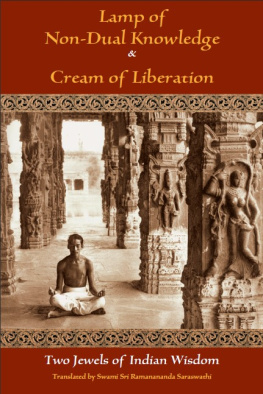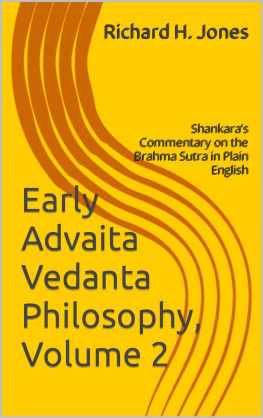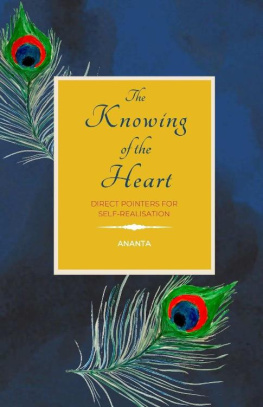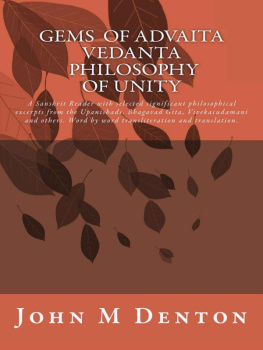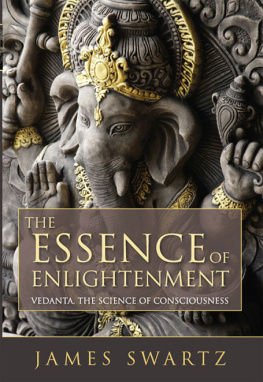Shanmugam P - The Truth About Spiritual Enlightenment: Bridging Science, Buddhism and Advaita Vedanta
Here you can read online Shanmugam P - The Truth About Spiritual Enlightenment: Bridging Science, Buddhism and Advaita Vedanta full text of the book (entire story) in english for free. Download pdf and epub, get meaning, cover and reviews about this ebook. year: 2017, genre: Religion. Description of the work, (preface) as well as reviews are available. Best literature library LitArk.com created for fans of good reading and offers a wide selection of genres:
Romance novel
Science fiction
Adventure
Detective
Science
History
Home and family
Prose
Art
Politics
Computer
Non-fiction
Religion
Business
Children
Humor
Choose a favorite category and find really read worthwhile books. Enjoy immersion in the world of imagination, feel the emotions of the characters or learn something new for yourself, make an fascinating discovery.
- Book:The Truth About Spiritual Enlightenment: Bridging Science, Buddhism and Advaita Vedanta
- Author:
- Genre:
- Year:2017
- Rating:4 / 5
- Favourites:Add to favourites
- Your mark:
- 80
- 1
- 2
- 3
- 4
- 5
The Truth About Spiritual Enlightenment: Bridging Science, Buddhism and Advaita Vedanta: summary, description and annotation
We offer to read an annotation, description, summary or preface (depends on what the author of the book "The Truth About Spiritual Enlightenment: Bridging Science, Buddhism and Advaita Vedanta" wrote himself). If you haven't found the necessary information about the book — write in the comments, we will try to find it.
Shanmugam P: author's other books
Who wrote The Truth About Spiritual Enlightenment: Bridging Science, Buddhism and Advaita Vedanta? Find out the surname, the name of the author of the book and a list of all author's works by series.
The Truth About Spiritual Enlightenment: Bridging Science, Buddhism and Advaita Vedanta — read online for free the complete book (whole text) full work
Below is the text of the book, divided by pages. System saving the place of the last page read, allows you to conveniently read the book "The Truth About Spiritual Enlightenment: Bridging Science, Buddhism and Advaita Vedanta" online for free, without having to search again every time where you left off. Put a bookmark, and you can go to the page where you finished reading at any time.
Font size:
Interval:
Bookmark:
The Truth About Spiritual Enlightenment
Shanmugam P
I would like to dedicate this book to these two important people who played a role in shaping me, nurturing me and tutoring me:
1) To Mrs. Dhanalakshmi , my Tamil teacher at Sri Kailasam Memorial High School, T.M.Puram, Tirunelveli dist, Tamil Nadu, India
2) To Mrs. Usha Raman, the principal of Sri Jayendra Saraswathi Swamigal Golden Jubilee Matriculation Higher Secondary School, Sankarnagar, Tirunelveli, Tamil Nadu, India
Copyright 2017 by Shanmugam P
All rights reserved. This book or any portion thereof may not be reproduced or used in any manner whatsoever without the express written permission of the author, except for the use of brief quotations in a book review.
Table of Contents
Contents
Introduction
Many years ago, a 18 year old boy became frustrated with his life and decided to end his life. He had lost all his hope and he couldnt find any reason to live. He was lonely, insecure and totally dissatisfied with the way things were happening to him. But then he started to think about his decision, The worst thing that can happen to me is my death and I am ready to die. If I have the courage to face death, why shouldnt I have the same courage to face life? Death can wait for me; I can postpone it as long as I want. If I had made up my mind to die, why should I die today? What is the hurry? I can die when it is no longer bearable. I can just live my life whichever way I want; and if it gets too much, then I will choose death.
The young guy didnt die. He decided to wait. He lived, learned, contemplated on life, meditated now and then and went through a rigorous spiritual journey. About a decade later, he grew up to be a peaceful, happy and fulfilled man with no signs of depression, anxiety or misery. He is the author of this book. Yeah, thats me!
This book is a detailed account of everything that I learnt, experienced and realized in my life. After analysing Buddhist and Vedantic scriptures in the light of my own experience, I put together a detailed guide for subjective well being, peace and fulfillment that everyone is searching for in their life. It is not based on faith but it is an empirical approach to a peaceful and happy life. This book is a sincere attempt to bridge Science, Buddhism and Advaita Vedanta. So, this is not about blind beliefs, unexplained rituals, complicated dogmas or boring theories. This book gives you an empirical method to attain ultimate fulfillment, peace and happiness.
India is home for six orthodox philosophical schools of thought as well as a few heterodox schools. This land was home to many wise men and sages. For the last 3500 years, so much things have been written about human suffering and cessation of suffering. Many schools seem to have teachings which are contradictory to other schools. Buddha says one thing; Shankara says another thing; Science says something totally different. How do we reconcile all this? That is what I have done in this book. I am going to show you how Buddhism, Vedanta and Science are saying essentially the same thing.
Make sure you read all the chapters in the same order. Take your time in reading and understanding each chapter before you move on to the next chapter.
- Shanmugam P
Chapter One: Are We Really Happy?
How are you is probably one of the most asked questions in everyday conversations. When you meet a person after a long time, your first question to him is regarding his subjective well being. This obviously indicates a fact: Your subjective well being is the most important thing in your life. Everyone strives for a happy, satisfied and peaceful life. It is the only reason why people want to make more money, become more successful or work day and night. Even if you want to sacrifice the pleasures of your life for a good cause, it is still based on the fact that you feel good about it.
But this search for the happiness never stops. You have to keep striving for maintaining a certain level of happiness in your life. When I was a child, I thought that becoming a grown up is all I have to do to be permanently peaceful and happy. But once you are grown up, you know that there are thousands of things which can cause you stress. Stress and depression is a very common problem for a lot of people in life. Above all, there is always an underlying dissatisfaction in life with the way things are. We always want certain things to be different to make us happy. This search for happiness and making efforts for our well-being continues throughout our lives even though the level of happiness is always the same. We have hopes and dreams for future which seem to be promising ultimate well being. Most of the people go through their lives with dreams about the future and a hope that they will be more happier in the future than how they are today.
This is not to say that we dont enjoy our lives. We do. But this enjoyment needs constant protection and also gives you a feeling that this is not enough. You want more. You are not satisfied yet. While you are in the pursuit of searching for more money, more experience and more knowledge in life, your existing level of happiness can also be threatened by any number of things that can happen in your life. Fear and anxiety seems to be always a part of life and a life without worries seems to be impossible.
Psychologists say that people have a stable level of happiness that we maintain throughout our lives. Any negative or positive things that happen in our lives may decrease or increase the level of happiness temporarily but we always tend to return to this stable level of happiness. No matter how much money you make or how popular you become, there is not going to be a permanent gain in the level of happiness. But this level of happiness that we maintain is not something that gives us 100% satisfaction. So, we tend to do things to increase this level but return to the same old baseline happiness level again and again. Psychologists call this as hedonic treadmill.
Hedonic Treadmill
Hedonic treadmill is a term coined by psychologists Brickman and Campbell during 1971 in their essay titled Hedonic Relativism and Planning the Good Society. More than a decade later, Michael William Eysenck, a British academic psychologist, developed a psychology theory known as 'hedonic treadmill theory' by modifying this concept. Philip Brickman, Dan Coates and Ronnie Janoff-Bulman did a study that examined two groups of people: A group that won a large amount of money in lottery and another group of people who got paralysed due to an accident. Based on this research, they published the paper Lottery Winners and Accident Victims: Is Happiness Relative? in 1987. Our logic may suggest that people who won the lottery should be more happier than the people who were paralysed. But it was found that in the long term, neither of these groups appeared happier than the other.
Many further studies were conducted in the following years that gave more clarity to this hedonic treadmill theory. But one thing is clear from the theory: there seems to be no correlation between happiness and objective outcomes in the long term. The metaphor of hedonic treadmill indicates that in spite of the efforts that we make to increase the happiness, human happiness always seems to remain stationary. But if no efforts are made, happiness seems to decline. This makes us to constantly run on the hedonic treadmill for our entire lives.
There is another metaphor which can be applied to this. A human being lives his life as if his mind constantly on fire. Our fears, anxiety, hatred, delusion and dissatisfaction can be likened to fires that are burning incessantly.
Unsatisfactoriness and Suffering in Life
So, let us first understand this as an important truth: There is an underlying dissatisfaction, stress and restlessness in life which makes a person prone to suffering. Of course, this doesnt mean that people are always suffering or that the life is entirely miserable. But we cant rest in peace when we are living. Rest in peace is always associated with death because our mind hardly finds any rest. We have a big to-do list and agenda for our future. As long as the to-do list is ok, life seems to go on. But if something goes wrong in the to-do list or if our hopes and dreams are threatened, we suffer.
Next pageFont size:
Interval:
Bookmark:
Similar books «The Truth About Spiritual Enlightenment: Bridging Science, Buddhism and Advaita Vedanta»
Look at similar books to The Truth About Spiritual Enlightenment: Bridging Science, Buddhism and Advaita Vedanta. We have selected literature similar in name and meaning in the hope of providing readers with more options to find new, interesting, not yet read works.
Discussion, reviews of the book The Truth About Spiritual Enlightenment: Bridging Science, Buddhism and Advaita Vedanta and just readers' own opinions. Leave your comments, write what you think about the work, its meaning or the main characters. Specify what exactly you liked and what you didn't like, and why you think so.


